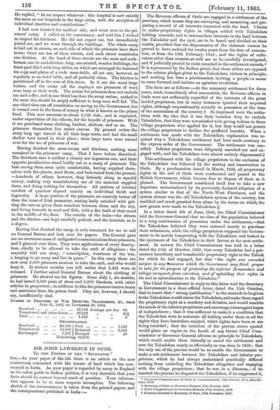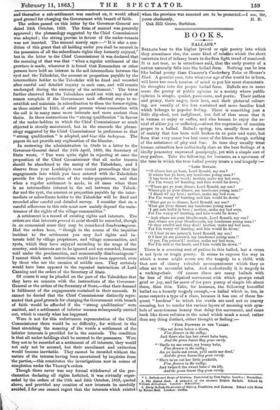SIR JOHN LAWRENCE IN OUDE.
To THE EDITOR OF THE " SPECTATOR."
SIR,—In your paper of the 5th there is an article on the new controversy connected with the tenure of land which has com- menced in India. As your paper is regarded by many in England as the safest guide in Indian politics, it is very desirable that your facts should be correct beyond reach of question. Your informa- tion appears to be in some respects incomplete. The following sketch of the circumstances is taken from the printed papers and the correspondence published in India :— The Revenue officers of Oude are engaged in a settlement of the province, which means they are surveying, and measuring, and pre- paring a record of all interests connected with the land. Claims to under-proprietary rights in villages settled with Talookdars holding sunnuds, and to intermediate interests in the land between the Talookdar and the ryot, are to be heard and decided on their merits, provided that the dispossession of the claimant cannot be proved to have endured for twelve years from the date of annexa- tion, or from the 13th February, 1844; and the rights of culti- vators other than tenants-at-will are to be carefully investigated, and if judicially proved to exist recorded in the settlement records.* It is represented by the Indian prints that these orders are opposed to the solemn pledges given to the Talookdars, vicious in principle, and nothing less than a proclamation inviting a people en masse to come forward and initiate an agrarian revolution.
The facts are as follows:—At the summary settlement for three years, made immediately after annexation, the Revenue officers in Oude were not sufficiently regardful of the interests of the great landed proprietors, but in many instances ignored their acquired rights, although unquestionably actually in possession at the time of the annexation of the country.t So impressed were the autho- rities with the idea that it was their bounden duty to exclude Talookdars, that they were not satisfied with giving redress to those village proprietors who applied for it, but they would not permit the village proprietors to decline the proffered benefits. When a settlement was made with the Talookdars, explanation was re- quired why a Talookdaree settlement had been made contrary to the express order of the Government. The settlement was can- celled. Inferior proprietors were diligently searched out and en- gaged with, and the Talookdars were almost entirely dispossessed.t
This settlement with the village proprietors to the exclusion of the Talookdars was followed by the mutiny and insurrection in Oude. By A proclamation issued in March, 1858, all proprietary rights in the soil of Oude were confiscated and passed to the British Government, which became free to dispose of them as it pleased. The Government considered itself free to take a new departure unincumbered by its previously declared adoption of a system similar to that of the North-West Provinces, and the system chosen was the old Talookdaree system of the country, but modified and much guarded from abuse by the terms on which the new grants were made to the Talookdars.§
In a letter dated 4th of June, 1859, the Chief Commissioner told the Governor-General that no class of the population believed in a long continuance of possession under the settlement,—that the Talookdars believed they were restored merely to purchase their submission, while the village proprietors supposed the Govern- ment to be merely temporizing with the Talookdars, and looked to the ejectment of the Talookdars in their favour at the next settle- ment. In answer the Chief Commissioner was told in a letter dated the 10th of October, 1859, that every Talookdar had a per- manent hereditary and transferable proprietary right in the Talook for which he had engaged, but that "the right was conceded subject to any measures which the Government may think proper to take for the purpose of protecting the inferior Zemeendars and village occupants from extortion, and of upholding their rights in the soil in subordination to the Talookdar."
The Chief Commissioner in reply to this letter told the Secretary to Government in a demi-official letter, dated the 15th October, that to insert that " strong qualification " in the sunnuds to be given tothe Talookdars would alarm the Talookdars, and make them regard the proprietary right as a mockery and delusion, and would unsettle the minds of the inferior proprietors and encourage extravagant hopes of independence ; that it was sufficient to make it a condition that the Talookdars were to maintain all holding under them in all the rights they have heretofore enjoyed, which rights have been or are being recorded ; that the insertion of the proviso above quoted would place an engine in the hands of any future Chief Com- missioner or Governor-General adverse on principle to Talookdars, which would enable them virtually to annul the settlement and oust the Talookdars nearly as effectually as was done in 1856 ; that the only use of the proviso would be to enable the Government to make a sub-settlement between the Talookdars and inferior pro- prietors, which he bad always maintained practically differed nothing from excluding the Talookdars altogether and engaging with the village proprietors ; that he was in a dilemma,—if he inserted the proviso he disgusted the Talookdars, if he suppressed it,
• Financial Commissioner of Oude to Commissioners, 15th October, 1861, 24th Oc- tober, 1864.
1. Secretary of State to Governor-General, 13th October, 1858.
Chief Commissioner to Governor-General, 17th October, 1809.
1 Governor-General to Secretary of State, 25th November, 1859. and thereafter a sub-settlement was resolved on, it would afford good ground for charging the Government with breach of faith.
The orders passed on this letter by the Governor-General are dated 24th October, 1859. The form of sunnud was generally approved ; the phraseology suggested by the Chief Commissioner
was adopted ; the strong proviso in favour of the under-tenants was not inserted. The sunnud merely says :—" It is also a con- dition of this grant that all holding under you shall be secured in the possession of all the subordinate rights they formerly enjoyed," but in the letter to the Chief Commissioner it was declared that the meaning of that was that " when a regular settlement of the province is made, wherever it is found that Zemeendars or other persons have held an interest in the soil intermediate between the ryot and the Talookdar, the amount or proportion payable by the intermediate holder to the Talookdar will be fixed and recorded after careful and detailed inquiry in each case, and will remain unchanged during the currency of the settlement." The letter further observed that the l'alookdars could not with any show of reason complain if the Government took effectual steps to re- establish and maintain in subordination to them the former rights, as these existed in 1855, of other persons whose connection with the soil is in many cases more intimate and more ancient than theirs. In these instructions the " strong qualification " in favour of the under-holders to which the Chief Commissioner so much objected is stoutly maintained, but in the sunnuds the phrase- ology suggested by the Chief Commissioner in preference to that "strong qualification" is adopted, and hinc ince lachryina. The papers do not provide any explanation of the blunder.
In reviewing the administration in Oude in a letter to the Governor-General dated the 24th April, 1860, the Secretary of State wrote, " You were quite right in rejecting at once the proposition of the Chief Commissioner that all under tenures should be abandoned to the mercy of the Talookdars, and I observe from your Lordship's more recent proceedings that the engagements into which you have entered with the Talookdars provide for the protection of the under-proprietors, and that when a regular settlement is made, in all cases when there is an intermediate interest in the soil between the Talook- dar and the ryot, the amount or proportion payable by the inter- mediate or subordinate holder to the Talookdar will be fixed and recorded after careful and detailed survey. I consider that on a careful adherence to this rule must now mainly depend the main- tenance of the rights of the village communities."
A settlement is a record of existing rights and interests. The orders are that interests proved to exist should be recorded, though in an economical sense they may be considered disadvantageous. Had the orders been, " though in the course of the inquiries incident to the settlement you may find rights and in- terests held by village proprietors, and village communities, and ryots, which they have enjoyed according to the usage of the country, such interests are to be ignored and not recorded, because void under the proclamation, and economically disadvantageous" I cannot think such instructions would have been approved, even by those who are the enemies of middle men. They certainly would have been opposed to the repeated instructions of Lord Canning and the orders of the Secretary of State.
Of course it may be pleaded on the part of the Talookdars that they have no concern with the instructions of the Governor- General or the orders of the Secretary of State,—that their demand is fulfilment of the engagements contained in their sunnuds. It cannot be denied that the Chief Commissioner distinctly repre- sented that good grounds for charging the Government with breach of faith would be afforded if the "strong qualification" were omitted, and a settlement of inferior tenures subsequently carried out, which is exactly what has happened.
Were it not for this unfortunate representation of the Chief Commissioner there would be no difficulty, for without in the least stretching the meaning of the words a settlement of the inferior interests is provided for in the sunnuds. The condition is that all under-holdings shall be secured to the possessors. Were they not to be recorded at a settlement of all interests, they would not only not be secured, but their annulment and extinction would become inevitable. They cannot be recorded without the nature of the tenures having been ascertained by inquiries from the parties,—this constitutes the investigations now in course of completion under the Viceroy's orders.
Though there never was any formal withdrawal of the pro- clamation declaring all rights forfeited, it was .virtually super- seded by the orders of the 10th and 24th October, 1859, quoted above, and provided any creation of new interests be carefully avoided, I for one cannot regret that the interests which existed when the province was annexed are to be protected—I am, Sir,































 Previous page
Previous page